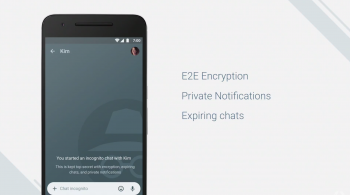
Allo doesn’t offer default end-to-end encryption setting because it would disable Google Assistant
When Google unveiled Allo — their smart messaging app coming soon to Android and iOS — one of the more interesting features they revealed was end-to-end encryption. As we later learned, the technology powering Allo’s end-to-end encryption was built upon Signal Protocol, the same open-source protocol from Open Whisper Systems that WhatsApp currently uses.
We’ve known since the announcement that E2E encryption was a feature of Allo’s Incognito mode, but now Ars Technica has confirmed exactly why this is the case. Because Google Assistant is such a huge part of Allo, it simply wouldn’t be possible for Google to listen in on conversations and provide smart suggestions for restaurants, or quick replies.
This is after Thai Duong, the co-leader on Google’s product security team, made it known in a blog post that he wished Allo’s E2E encryption was enabled by default (outside of Incognito Mode) — not an option left up to the user. The sentiment was further echoed by Edward Snowden in a Twitter post, advising users to avoid using it for now.
It didn’t take long for Duong’s higher-uppers to get word and the blog post was promptly revised (several times, actually). Duong did mention that it would be possible for Google to add a default encryption option where Google Assistant would only work when messaged directly, but there’s currently no plans to add such a feature.
In the end, what it comes down to is whether the user values Google Assistant over the privacy of Incognito Mode. It’d be nice to have both, but for now it’s just one or the other.